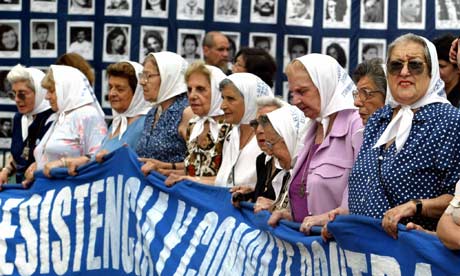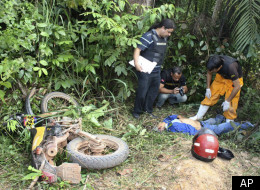By Emilee Gaebler
Impunity Watch Reporter, South America
CARACAS, Venezuela – For the past two weeks, the Venezuelan National Guard has been in a standoff with the inmates of the Rodeo II prison. Inmates gained control of the prison back on June 12 during an armed conflict between two prisoner gangs, vying for control of the prison. The fighting between the rival gangs killed at least 29 and injured many others.

- Soldiers oversee inmates of El Rodeo during an attempt to regain control. (Photo Courtesy of BBC News)
Authorities state that an earlier raid of the Rodeo I prison resulted in the seizure of a number of weapons, drugs and cell phones. During this raid two members of the police force and one inmate were killed. The Rodeo II unit remains under siege.
Roughly 4,000 members of the National Guard were stationed at the Rodeo prison in Guatire, 50 kilometers east of Caracas. Worried family members of prisoners have also gathered, some of them throwing stones at the soldiers. In response, soldiers have fired tear gas at the crowd to try and disperse them. Inside Rodeo II, there remain up to 1,200 inmates, with only 50 of them being a part of the resistance.
The government announced that one member of the National Guard was killed and 19 others injured. They do not know if any casualties have been suffered by the inmates. However, a recently posted YouTube video, allegedly from within the prison, shows two white freezers being opened to reveal a dead body in each. The narrator is heard saying “two of the compatriots who have died in the fight.” As the video comes to an end, the sound of gunfire can be heard in the background.
An inmate, one of the 36 prisoners that the National Guard was able to rescue on Monday night, claims that the soldiers want to massacre everyone inside the prison. He said that the soldiers killed several prisoners during the rescue mission.
Text messages sent from inside the prison are pleas for the government to spare the lives of those not involved in the resistance. Other messages describe the soldiers opening fire on prisoners who had come out into the courtyard, waving a white flag above their heads as a sign of surrender.
The conditions of Venezuelan prisons have been a concern for human rights groups since 2008. “In Venezuela, prisoners are often held in cruel, inhuman and degrading conditions and violence is endemic,” said Guadalupe Marengo, Deputy Director of Amnesty International’s Americas Division. At the El Rodeo prison roughly 3,600 prisoners were imprisoned but the facilities were only built to contain 750 people.
Marengo urges the Venezuelan government to “promptly launch an independent investigation into what went wrong at El Rodeo, establishing responsibility for the high level of weapons in the prison, and ensure that similar incidents are not repeated in the future.”
Director of El Rodeo II, Luis Rafael Aranguren and Rubén José González Heredia, Vice-director of El Rodeo I have been arrested on allegations of illegally facilitating the movement of drugs and arms into the prison and corruption charges.
For more information, please see;
The Guardian – Venezuelan Prison Siege: El Rodeo Directors Arrested – 28 June 2011
Amnesty International – Deadly Clashes Highlight Need for Urgent Prison Reform in Venezuela – 22 June 2011
CNN – Standoff is Latest in Venezuelan Prisons’ History of Problems – 21 June 2011
The Guardian – Venezuelan Government Troops Continue Assault on Riot-Torn Prison – 21 June 2011
International Business Times – Stand-Off Continues in a Venezuelan Prison – 20 June 2011
BBC News – Venezuelan Forces Storm Prison ‘to Protect Lives’ – 17 June 2011

 Scandal hits Argentina’s mothers of the disappeared (Photo courtesy of The Guardian).
Scandal hits Argentina’s mothers of the disappeared (Photo courtesy of The Guardian).
 Former Tijuana mayor charged in weapons case. (Photo courtesy of The Washington Post).
Former Tijuana mayor charged in weapons case. (Photo courtesy of The Washington Post).